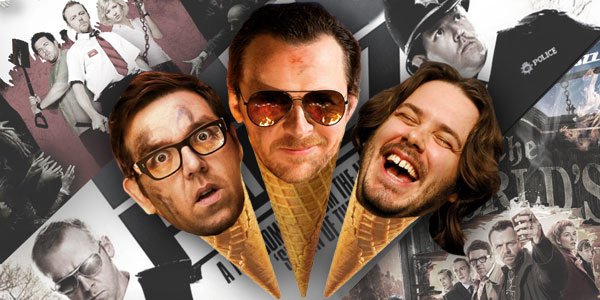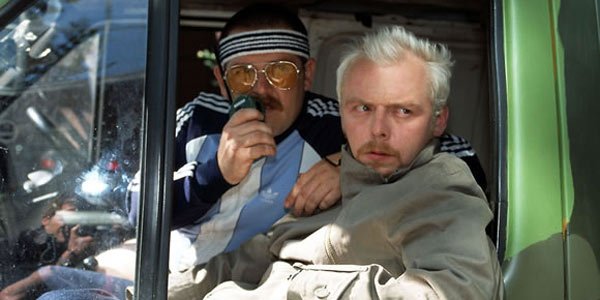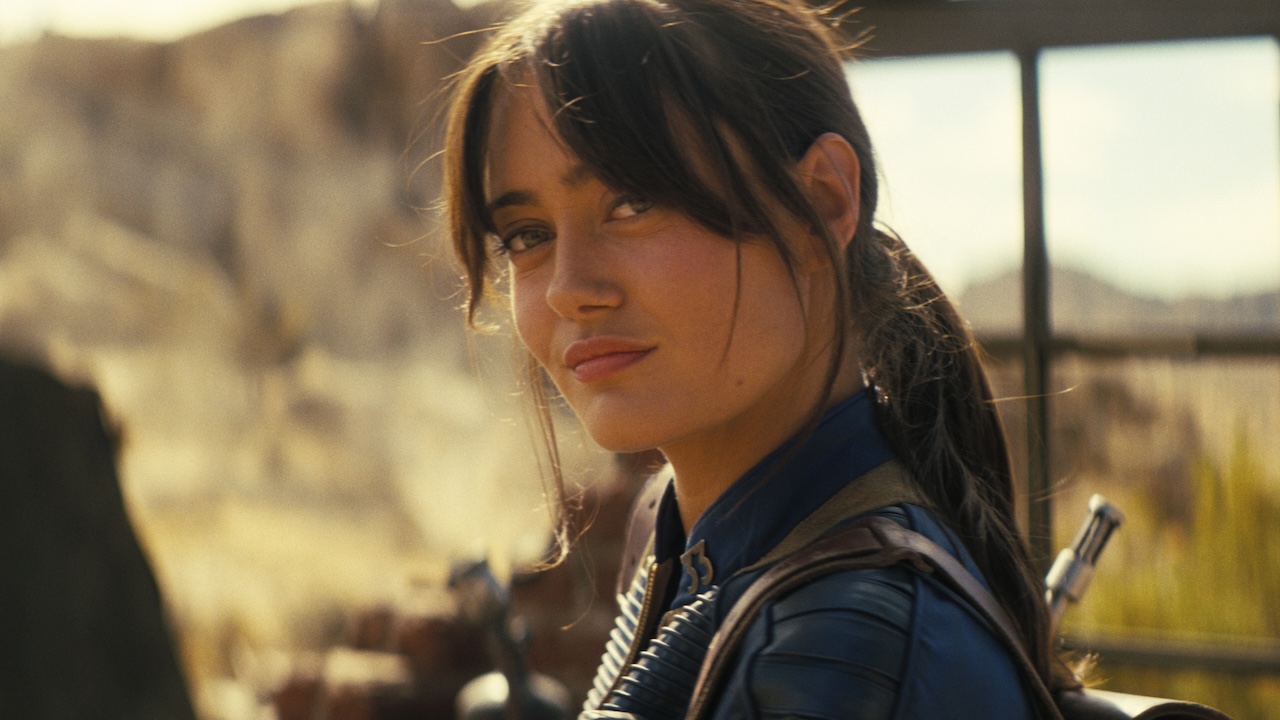The Cornetto Trilogy Golden Mile, Day 12: Simon Pegg And Nick Frost Reveal What They'd Do With A $100 Million Budget

By now I'm not sure how you can be unaware that Edgar Wright, Simon Pegg and Nick Frost have a new movie in theaters. The World's End, the third film the trio have made together, is the conclusion of what they call The Cornetto Trilogy, three genre-bending, incredibly funny movies that, when you put them together, about all the ways it can totally suck to grow up. The World's End may be the darkest and, naturally, the most mature of the three-- Pegg is once again the central character but playing the kind of screw-up who's hard to like, an alcoholic who yearns so deeply for his high school days that he drags his old pals-- including Frost as buttoned-up lawyer Andy-- on a pub crawl in their hometown. They eventually realize their town has been taken over by robots, but the night has gone downhill way before then, as Gary tries and fails over and over again to prove that you really can go home again.
Pegg and Frost, who at this point in their lives have probably done a billion of these interviews together, are a fantastic team to watch on film and a tough one to interview-- you get the sense that they've choreographed their responses to the T, and as much as you want to just watch the two of them joke with each other, you and your dumb questions keep getting in the way. But I did relish the chance to call out Pegg for riling up the Internet with a single tweet, to ask the two of them if their off-screen relationship is as important as we make it out to be, and to ponder what would happen if the three of them got $100 million to make a movie. The answer? Fast Seven. In a house carved out of a single diamond.
For more on The World's End you can read our review and find lots more about it all over the site. It's open in theaters everywhere this weekend. Get out there and see it!
Simon, to start with, I just have to call you out. I feel like you knew that you were going to rile up the internet with those pictures of Ant-Man. I know that everyone overreacted ridiculously, but you knew that was going to happen, right?
Pegg: Well I was at Marvel, I’d gone to do the Marvel podcast and I had a bit of time, so I was looking around. They’ve got an amazing mural in reception and I realized I was standing next to Ant-Man, so in the picture it’s like, “Hey look, Ant-Man. It’s Edgar’s new film,” and then the most absurd storm of speculation. It almost annoyed me that people were that fucking concerned about something so facile as who’s going to play a fucking ant. It was like, grow up. It’s a picture.
It’s August. It’s a slow news month. People are going to make something out of nothing.
Pegg: The ironic thing is, and I don’t mean to be flippant in any way, but hundreds and hundreds and hundreds of people died in the streets of ancient Egypt recently and no one’s tweeting about that.
Your Daily Blend of Entertainment News
So, you guys have talked a lot about the way that this movie is dealing with nostalgia and I think it’s interesting that you guys are kicking off 90s nostalgia. But when you talk about the movies that people grew up with in the late 70s and 80s, a lot of it was nostalgia for the 60s and the 50s, like you get American Graffiti and you get Happy Days and in the 80s you’re already getting remakes of 50’s sci-fi movies. Did you guys realize that you were kind of growing up with a lot of culture that was other people’s nostalgia for an earlier time and did you guys feel like that kind of trickled down to all of us as we grew up with various pop culture like that?
Pegg: I don’t know. The nature of nostalgia is simply that you are romanticizing a time that’s gone because the time you’re in is somehow dissatisfactory, whatever you are. You know, we’re going to be nostalgic about this phone conversation in 20 minutes. It’s just what nostalgia is. It’s never really about the time you’re being nostalgic for. It’s just, I suppose the idea of simplicity and a time that’s physically away from where you are now. All we wanted to do was go back 20 years. It wasn’t because we’re being nostalgic about the 90s. That was 20 years ago, and then we decided, then you start fishing around in the culture of the time and you pull up a lot of great stuff, like the music. Music is a great nostalgic tool, because it’s at once timeless and dated. It has a specific time of inception, but it lasts forever. It’s kind of ok to be nostalgic about music, but the point of Gary’s nostalgia is that he’s clinically depressed and all he’s doing is he’s clinging to the last time he was truly happy. So, it’s about the danger of nostalgia, as much as anything.
Frost: I mean, if you’re talking about me and nostalgia, I’m kind of out of the three of us, the least nostalgic and I would probably put that down to my past perhaps being the shittiest out of the three.
Pegg: Apart from about house music. You’re very nostalgic about house music.
Frost: Yeah, but I can still dance a lot. I think I’ve always been a man who’s been driven and controlled by my impulses, so to speak. You know, I think you get nostalgic when you don’t act upon something that you have the opportunity to act upon, i.e. hitting a bully or kissing a girl or telling somebody you love them and I think, for the, you know, I did those things, you know, so I can’t really look back and think, “God, I should have done that,” because I kind of probably did it and probably got into a lot of trouble doing it. To be honest, I’m happiest right now. I mean, not in this room, but just generally. So, you know, my need for nostalgia is minimized, I think.
I’m sorry you’re not as happy in the room, but I guess I don’t blame you, for being locked in the Waldorf Astoria all day.
Frost: It’s packed full of Louis XV style furniture and there’s muffins, so, you know, it could be worse.
Given that you guys have made as many movies as you have together by now, the relationship that you have really comes out in the scenes you have together. I wonder if you think that people kind of overestimate the extent to which you have to know someone that well to have that chemistry , or if you’ve noticed how that has evolved for the two of you as worked together as much as you have over the years.
Frost: You know, Simon and I have a shorthand, which means we know how to work together. We just go straight into it and there’s never a moment when we’re wondering how the hierarchy works or “Can I say this?” In terms of the chemistry, you know, I worked with someone last year and we had chemistry immediately, and it showed. Sometimes you just meet people, and that happens. Other times, you can really like someone, but on set you have no chemistry at all. You know, does that detract from the performance, or what people see on the screen? I’m not sure it does, you know. If you’re a good enough actor, I think you can hide bad chemistry.
Pegg: Yeah, I agree with Nick, but I think that the relationship that Nick and I have off screen only enhances that relationship we have on screen. You know, I’d never worked with Eddie Marsan before this film, but I loved working with him on The World’s End.
He’s amazing.
Pegg: …as I did with Rosamund Pike, who I went on to work with again in a film subsequently and actually, we used the relationship, our friendship that we;d sort of developed on World’s End to sort of fundamentalize our relationship on the film we did afterwards, which was nice. But, for Nick and I, and Edgar, we understand each other very clearly and what it offers us is a means of communication and a way of working which is very efficient and effective. So, I believe pre-existing knowledge of each other can be an enormous help, but it’s not always necessary.

Well, and there’s also a way that knowing people that well, you can kind of get stuck in a rut together, and you can see people who have worked together over and over again and basically keep making the same movie over and over again, and you guys haven’t done that. I wonder if you’ve ever kind of looked and worried that you were on the brink of repeating yourself, kind of like the guys in this movie, like sticking by your friends to the point that you shouldn’t be anymore and how you get over that and do make original work that fulfills you guys even though you’re very different people than you were when Spaced started.
Pegg: I’d be worried if we did go and make the same thing again, because it would mean we kind of didn’t care, let’s go and do that again, because that worked. I don’t think we’re wired that way. In The World’s End we wanted to create something specifically that was almost kind of a combination of what was in the first two films, so that it drew them together so we could actually say, “Yes, it’s a trilogy.” It was important to us that we make a film that drew to a close and together some of the themes and ideas that we’d explored in the first two films. So, the enemy in The World’s End, which is almost a combination of the NWA [of Hot Fuzz] and the zombies [of Shaun of the Dead], which is kind of like a homogenizing force discipline and a specific way of doing things. Those two things come together and they create what we have in The World’s End, which is the network. We couldn’t possibly make the same film. We wanted to make something that was at once different, but at the same time, had the right level of familiarity that it felt like part of the same piece.
Frost: I think we’d rather not make something than repeat ourselves. I think people start to repeat themselves when they have a big hit. If you have a big hit, it does $300 million at the box office, then you do another one and it kind of does the same, you kind of get complacent. You’ve got a shit load of money and you’ve probably said, “Oh, well that works, let’s do that again,” and I think that’s where you can kind of run into a problem, if you lose your ambition through great success.
To look at the brighter angle of this, I watched the conversation you guys had with Peter Jackson in New Zealand, and kind of thinking about how he has his sort of island of filmmaking, where he has the entire New Zealand filmmaking industry and he can make these gigantic movies. Say The World’s End makes 300 million dollars. Would you take that empire? Would you do, you know, go spend 10 years making movies in the same world and have all the money in the world to do it, or do you guys worry that that would wear you out. Is that part of why you have made these three very different movies?
Pegg: Yeah, I guess so. We want to keep it interesting as well, and as much as, as a huge challenge as it is, it’s always good to work with a finite amount of resources, because it forces you to be creative. It makes me extremely sad sometimes to look at these huge follies sometimes, that Hollywood puts out, where they throw bad money after bad money because they’re trying to save something that’s going to fail ultimately. And they end up spending 500 million on something which nobody goes to see, because in the outset they’ve just give as much money as they want. Whereas, we couldn’t go over 30 million dollars with this, that was our budget and that was all we had and if we’d gone a penny over, we would have incurred certain tax things, which would have screwed us. So, we were forced to make the film with the money we were given to make it with.
If you’re just given any old freedom to just spend, spend, spend, you’re just going to. You know, directors are crazy people. They’ll spend it, you know. I think, Edgar included. Edgar, you know, would have been hugely glad of another 10 million dollars for this film, just because it would have given us more time, made it less stressful, but the fact is, we were having to solve problems inventively and creatively and it only added to the process of making the film. It shouldn’t be easy. Art, if I can call it that, shouldn’t be easy.
Have you guys ever talked about what your 100 million dollar movie would look like?
Frost: It’d be us and a bunch of strippers.
Really expensive strippers!
Frost: Yeah, well they cost a lot these days. No, I don’t know. If we were given that much money to make a film, I still think we’d end up struggling, because we’d just increase our ambitions even higher. So, we’d end up trying to pull it in for that.
You’d set it on the moon, and it’d be over.
Pegg: It’s never changed for us. Spaced was like 150k an episode or something, and that was difficult. Shaun was 6 million dollars and that was difficult. Hot Fuzz, 17, again, difficult. And World’s End, similarly, we always take what we’ve got and try and go bigger that it, so we’re always fighting our resources.
Frost: Also, I think, you know, I think we’ve proved that you could make, you know, you can see where all our budget went. It’s on the screen. So, I think if we were given 100 million dollars to shoot a movie, we’d probably spend 60 on it, then split the other 40 between us.
Pegg: Well, because of the way residuals work in the UK, we’ve never really seen any money from any of our films. So, I think, if we were given 100 million dollars to make a film, we’d just run away, take the money, and say, “Fuck you. You owe us this.”
It’d be like the end of Fast Five, where they all retreat to their own private islands. Frost: Yeah, exactly, we’d make Fast Seven. In a big house, chiseled out of a single diamond.
Staff Writer at CinemaBlend

